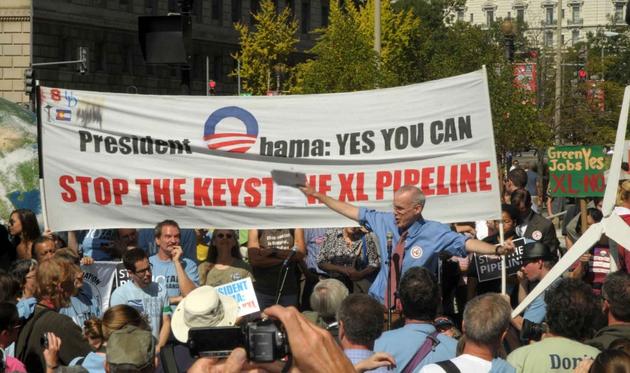Cross-posted from ThinkProgress Green.
Proponents of the dangerous Keystone XL project claim that construction of the 1,700-mile tar-sands pipeline from Canada to Texas will create tens of thousands, if not hundreds of thousands, of much-needed jobs across the country. “Jobs for the 99%!” proclaims a website funded by the American Petroleum Institute (API). The Wall Street Journal promises “13,000 union jobs.” On the House floor today, Rep. Alan Nunnelee (R-Miss.) claimed the pipeline will create “20,000 high-wage construction jobs.” Rep. John Shimkus (R-Ill.) says the pipeline will “create 14,600 jobs in Illinois.” The U.S. Chamber of Commerce claims the project will create “more than 250,000 permanent jobs.” “U.S. jobs supported by Canadian oil sands development could grow from 21,000 jobs today to 465,000 jobs by 2035,” said API Executive Vice President Marty Durbin.
Accepting these figures, reporters like CNN’s Steve Hargreaves, NPR’s Ari Shapiro, and The New York Times‘ Kirk Johnson have portrayed the battle over the tar-sands pipeline as one of economic benefits versus environmental fears.
However, these tremendous-seeming jobs claims are based entirely on a report by the Perryman Group [PDF], commissioned by the pipeline’s owner TransCanada, whose results have been described as “dead wrong” and “meaningless” by Council on Foreign Relations fellow Michael Levi and environmental economist Andrew Leach, neither of whom oppose the construction of the pipeline.
The only independent analysis conducted of the American job-creation potential of the Keystone XL pipeline finds that between 500 and 1,400 temporary construction jobs [PDF] will be created, with a negative long-term economic impact as gas prices rise in the Midwest and environmental costs are borne:
Why this tremendous discrepancy? Examining TransCanada’s business operations, the Cornell Global Labor Institute report finds that TransCanada has already purchased most of the steel it intends to use for the pipeline from India; that most of the work will be conducted by people already employed by TransCanada; and that the Perryman Group included already-completed pipeline projects in its job-creation estimates.
“The operating costs for KXL are very minimal,” the Cornell Global Labor Institute report [PDF] explains, “and based on the figures provided by TransCanada for the Canadian section of the pipeline, the new permanent U.S. pipeline jobs in the U.S. number as few as 50.”
Unlike the Perryman Group’s “opaque” methodology, the Cornell report explains its calculations with full transparency [PDF].



